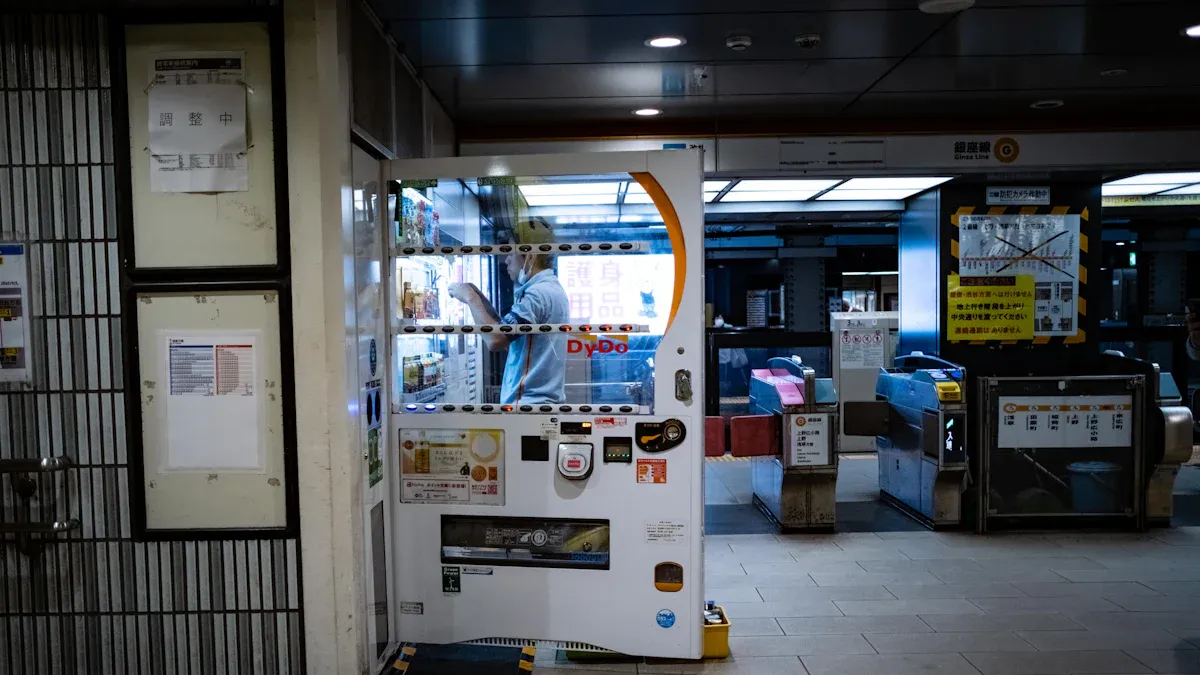Career Paths in Vending Machine Operations: Roles, Skills, and Opportunities

Vending machine operations offer several Career Paths you can explore. You might work as an operator, technician, assembler, route driver, sales representative, supervisor, or even become a business owner. Each role uses different skills. Some jobs need strong technical abilities, while others focus on leadership or customer service. You can find hands-on tasks or choose roles that let you manage people and processes. Think about your strengths and interests when you look at these opportunities.
Key Takeaways
Vending machine operations offer many career options like operator, technician, driver, sales rep, supervisor, and business owner.
Strong skills in mechanics, communication, time management, and problem-solving help you succeed in this field.
Daily tasks include refilling machines, fixing problems, handling cash, and providing good customer service.
You can start with entry-level jobs and grow into leadership or business ownership by learning and working hard.
Staying healthy, organized, and open to learning boosts your chances for success and advancement.
Career Paths in Vending Machine Operations

Vending machine operations offer many Career Paths. You can find a role that matches your interests and skills. Some jobs focus on hands-on work, while others involve leadership or business management. Here are the main Career Paths you can explore:
Operator
As an operator, you make sure vending machines work smoothly every day. You refill products, collect money, and check that each machine is clean and working. You keep track of inventory and report any problems. This role suits you if you like routine tasks and enjoy being organized.
Technician
A technician fixes and maintains vending machines. You solve problems when a machine breaks down or does not work right. You use tools to repair parts, test machines, and make sure everything runs safely. This job fits you if you enjoy working with your hands and solving technical problems.
Assembler
Assemblers build vending machines before they reach customers. You follow instructions and blueprints to put together parts. Your main duties include:
Reading and understanding schematics and blueprints
Positioning and aligning parts by hand or with hoists
Using hand tools and machines to assemble components
Checking for defects and fixing them
Cleaning your work area and equipment
Most assemblers need a high school diploma or equivalent. You usually get on-the-job training to learn assembly skills. Some companies may ask for special certifications, like soldering, if you work with certain machines.
Route Driver
Route drivers deliver products to vending machines and collect money. You drive a set route, restock items, and make sure each machine looks good. You also check for expired products and remove them. This job is good for you if you like driving and working on your own.
Sales Representative
Sales representatives help grow the vending business. You find new locations for machines and talk to business owners about placing machines in their buildings. You explain the benefits of vending services and answer questions. If you enjoy talking to people and making deals, this Career Path could be right for you.
Supervisor
Supervisors lead teams and make sure daily operations run smoothly. You manage employees, assign tasks, and hold meetings. You train staff on safety, inventory control, and new technology. You also handle customer complaints and work to improve processes. Important leadership skills for this role include:
Managing and leading teams
Delegating tasks and running meetings
Training employees on procedures and technology
Handling customer relations and solving complaints
Improving processes and managing inventory
Enforcing safety and health standards
If you like leading others and solving problems, you may enjoy this Career Path.
Operations Clerk
Operations clerks handle paperwork and support the team. You keep records of sales, inventory, and deliveries. You answer phone calls, schedule routes, and help with customer service. This job is a good fit if you are organized and like working in an office setting.
Business Owner
As a business owner, you run your own vending machine company. You choose what machines to buy, where to place them, and what products to sell. You manage money, hire staff, and plan for growth. This Career Path gives you the most freedom and responsibility. If you want to be your own boss and make big decisions, this path may suit you best.
Tip: Think about your strengths and interests when choosing among these Career Paths. Each role offers different challenges and rewards.
Key Responsibilities
Daily Tasks
You start each day by checking your vending machines. You look for any problems, such as empty slots or broken parts. You refill snacks and drinks, making sure each item is fresh. You wipe down the machine to keep it clean and inviting. You also record what you restock and note any issues for follow-up.
Tip: Clean machines attract more customers and help prevent health problems.
Maintenance and Repairs
You keep machines running smoothly by doing regular maintenance. You inspect moving parts, test buttons, and listen for strange noises. If a machine stops working, you fix it right away. You might replace a broken coil or reset the system. You also follow safety rules to protect yourself and others.
Check for worn-out parts
Replace faulty components
Test machines after repairs
Inventory and Stocking
You track what sells best and what needs restocking. You rotate products so older items sell first. You remove expired or damaged goods. You update inventory records to avoid running out of popular snacks or drinks.
Task | Why It Matters |
|---|---|
Rotate products | Keeps items fresh |
Remove expired food | Ensures safety |
Update inventory | Prevents shortages |
Customer Service
You answer questions and help customers who have problems. If someone loses money in a machine, you handle refunds quickly. You listen to feedback and suggest new products based on customer requests. Good service builds trust and keeps people coming back.
Cash Handling
You collect money from each machine and count it carefully. You record totals and check for errors. You deposit cash safely and follow company rules for handling money. Accurate cash handling helps prevent losses and keeps your business running smoothly.
Remember: Careful cash handling and honest records protect your job and your company.
Essential Skills

Mechanical Ability
You need strong mechanical skills in vending machine operations. Many roles require you to use tools, fix machines, and handle small parts. You must know how to spot problems and make repairs. Manual dexterity helps you work with wires, screws, and moving parts. If you enjoy building or fixing things, you will do well in this field.
Tip: Practice using hand tools at home to improve your skills.
Physical Strength
You often lift heavy boxes and move machines. Good physical strength and stamina help you finish your tasks without getting tired. You may need to stand for long hours or work in tight spaces. Staying active and healthy makes your job easier.
Task | Physical Skill Needed |
|---|---|
Lifting products | Arm and back strength |
Moving machines | Full-body strength |
Stocking shelves | Endurance |
Communication
You talk to customers, coworkers, and supervisors every day. Good communication helps you solve problems and share information. You must listen carefully and explain things clearly. Friendly service builds trust and keeps customers happy.
Time Management
You have many tasks to finish each day. Good time management helps you stay on schedule. You must plan your route, restock machines, and handle repairs quickly. Using a checklist or planner can help you stay organized.
Problem-Solving
You face new challenges often. Machines may break, or products may run out. You must think fast and find solutions. Creative thinking and adaptability help you fix issues and keep operations running smoothly.
Entrepreneurship
If you want to own a vending business, you need business skills. You must manage money, choose products, and find new locations. Leadership and decision-making help you grow your business. Attention to detail and customer focus set you apart from others.
Remember: Building these skills opens more opportunities in vending machine operations.
Advancement and Opportunities
Career Progression
You can start your journey in vending machine operations with an entry-level job. Many people begin as route drivers or operators. As you gain experience, you may move up to become a supervisor or manager. You will learn new skills on the job, such as handling inventory and leading a team. Some companies offer training programs to help you grow. If you show strong work habits and leadership, you can advance quickly.
Tip: Always ask for feedback from your supervisor. This helps you improve and shows you want to learn.
Specialization
You can choose to specialize in a certain area of vending machine operations. Some people focus on healthy vending, which means stocking machines with snacks and drinks that are better for you. Others may work with new technology, such as cashless payment systems or smart machines. Specializing can make you more valuable to your company. It can also help you stand out if you want to start your own business.
Here are some areas where you can specialize:
Healthy vending products
Technology and machine upgrades
Customer service and sales
Machine repair and maintenance
Entrepreneurship
You may decide to start your own vending machine business. As a business owner, you choose where to place your machines and what products to sell. You manage your money and plan for growth. Many people who start as operators or technicians use their experience to become business owners. This path gives you the most freedom and control over your work.
Note: Learning about different Career Paths in vending machine operations can help you decide which direction fits you best.
Getting Started
Education and Training
You do not need a college degree to start in vending machine operations. Most jobs require a high school diploma or GED. Many companies provide on-the-job training. You learn how to refill machines, handle cash, and fix simple problems. Some employers offer classes on safety and customer service. You can also watch online videos or read guides to build your skills.
Certifications
You may see vending machines with a UL certification label. This label means the machine meets strict safety standards. UL certification protects you and your customers from electrical hazards and fire risks. It also helps your company meet insurance rules and avoid legal trouble. Using certified machines keeps your business safe and trusted.
Certification Type | Benefits Provided | Risks of Non-Certification |
|---|---|---|
UL Certification | - Ensures electrical safety and reliability | - Higher risk of malfunctions |
Entry-Level Jobs
You can start as a route driver, operator, or assembler. These jobs teach you the basics of vending machine work. Look for job openings online or ask local vending companies. Entry-level pay often ranges from $13 to $18 per hour, depending on your area and experience. Some jobs offer overtime or bonuses.
Tip: Show up on time and work hard. Employers notice reliable workers and may offer promotions.
Tips for Success
Stay active and healthy. You may lift heavy boxes or stand for long hours. Wear comfortable shoes and use safe lifting methods. Practice good communication with customers and coworkers. Keep learning new skills, like using tools or tracking inventory. Set goals for your career and ask for feedback to improve.
Remember: Every expert started as a beginner. Your effort and attitude help you grow in vending machine operations.
You can find many Career Paths in vending machine operations. Each path offers unique responsibilities and skills. You might enjoy hands-on work, leadership, or running your own business. Think about what interests you most. Take action by researching local job openings or signing up for training.
Start your journey today and discover where your skills can take you!
FAQ
What skills help you succeed in vending machine operations?
You need good communication, basic mechanical skills, and strong time management. Physical strength helps with lifting. If you want to own a business, you also need money management and leadership skills.
How much can you earn in entry-level vending jobs?
Most entry-level jobs pay between $13 and $18 per hour. Your pay depends on your location and experience. Some companies offer overtime or bonuses.
Do you need special training to become a vending machine technician?
Most companies provide on-the-job training. You learn to fix machines and use tools. Some employers may ask for a high school diploma or a technical certificate.
Can you start your own vending machine business?
Yes! You can buy machines, choose products, and find locations. You manage your money and plan for growth. Many people start small and add more machines over time.
What are the biggest challenges in this field?
You may face machine breakdowns, theft, or product shortages. You need to solve problems quickly and keep customers happy. Staying organized and learning new skills helps you handle these challenges.
